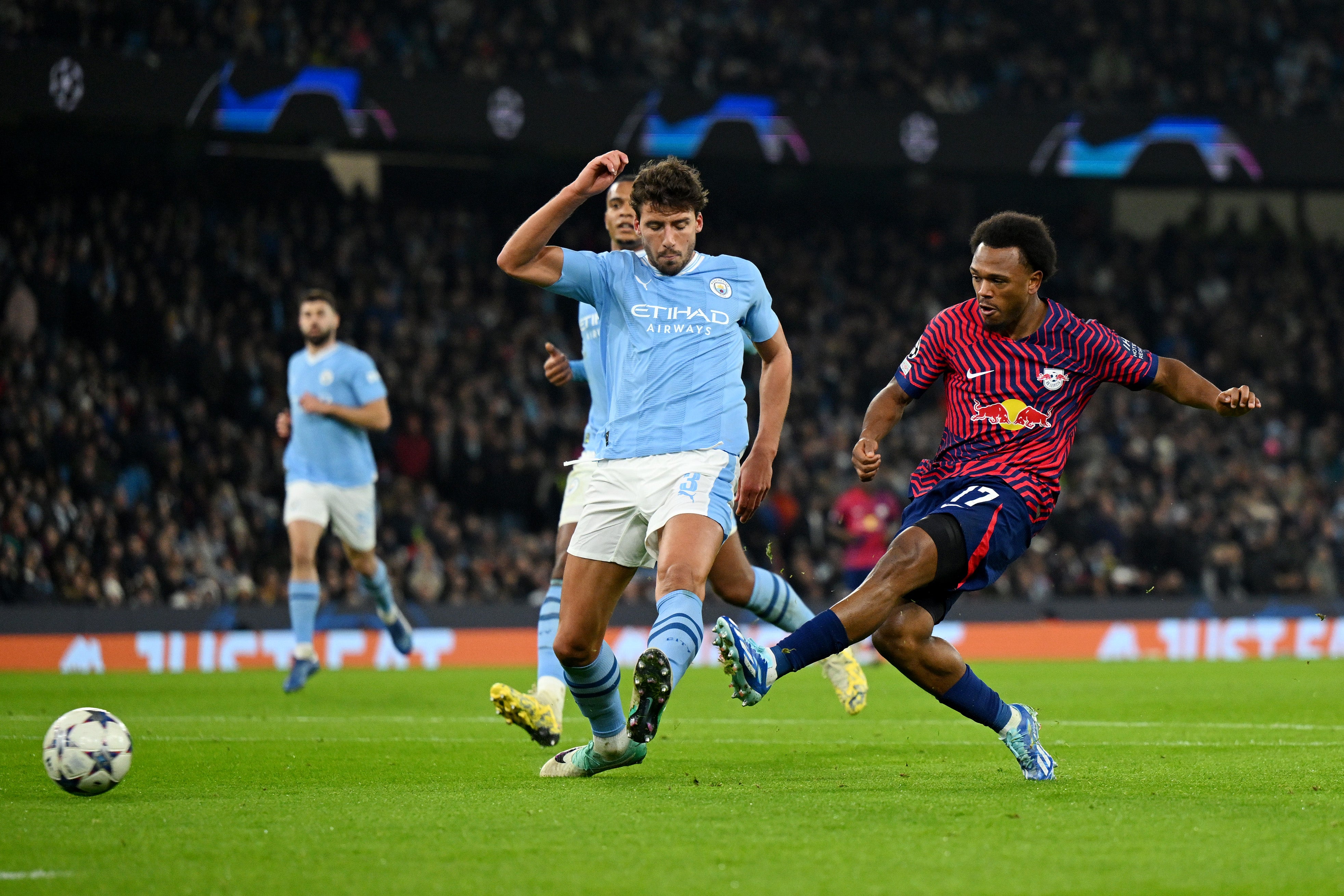Man City must tighten up — or Champions League history may repeat itself
Sign up to Miguel Delaney’s Reading the Game newsletter sent straight to your inbox for free
Sign up to Miguel’s Delaney’s free weekly newsletter
Thanks for signing up to the
Football email
“Today we were lucky,” said a manager who likes to exert a level of control that means fortune is not a factor. Manchester City have come from two goals down to win 3-2 under Pep Guardiola before, when there was rather more at stake, when they won the Premier League title on the final day of the 2021-22 season. When they mustered a similar, if less important, comeback against RB Leipzig, Guardiola felt the context accounted for a strangely poor start. “I am pretty sure if we have to win the game to qualify, we would not play the way we played,” he said.
Not that it rendered it a complete one-off. It was Guardiola himself who invoked Chelsea, the first 4-4 draw in his managerial career and a game that had the feel of an anarchic anomaly. “It is not normal to concede four goals in the way we did against Chelsea and [two] today. It didn’t happen last season, that it is the truth,” he said. And if the scoreline at Stamford Bridge may remain unique, there are other elements to consider.
In the Premier League, Andre Onana has more clean sheets than Ederson. In all competitions, City only have two shutouts in their last 12 games. In the Champions League, they have a lone clean sheet in five matches, even though ties against Red Star Belgrade and Young Boys Bern suggested they should not be breached for much of the group stage. Many of the goals they have conceded have had common denominators: City have been caught on the break. Leipzig proved masters of devastating transitions, Lois Openda taking his tally against City to three goals already this season.
There were damning details, individual errors. “Human beings, it happens,” mused Guardiola but Manuel Akanji left the ball and let the Belgian run in behind him for the opener. Then the defence was on different wavelengths for Openda’s second with Akanji going forward into no-man’s land to try and press, Ruben Dias committing and not getting the ball and Josko Gvardiol nowhere near the Portuguese.
That Dias was fortunate to escape a red card before his half-time substitution felt pertinent, especially when Guardiola referred to another piece of poor decision-making. “Sometimes I have the feeling the players are so anxious,” he said. “The first yellow card from Ruben is not necessary to put the feet here. This kind of actions – oh, what happened? So control the ball and if you don’t win the duel… but you are there and you have to avoid that. You have to get better. When you have long balls you have to win the duels, you have to be strong there and we were not. We made individual mistakes and individually we were sloppy.”
Which City rarely were when winning the Champions League. They only conceded three goals in seven games in the knockout stages, five in 13 over the competition; they have let in five already this season and without facing teams of the calibre of Bayern Munich, Real Madrid or Internazionale.
Openda beat Dias to put RB Leipzig in front
Then it seemed that City had found a cure for their historic weakness. Speed on the break has long looked one of the few ways to beat Guardiola’s City: it is something regularly deployed by Jurgen Klopp’s Liverpool, while they have been caught on the counter-attack by Tottenham teams under a succession of managers. A high-speed attacker – whether Ivan Toney, Wilfried Zaha or Adama Traore – can be required to trouble City and Openda belongs in that category.
Yet other quick players have been nullified when City are at their best. Current issues can reflect individual mistakes – Gvardiol was culpable for Raheem Sterling’s goal for Chelsea, while Dias conceded a late penalty then – and players falling short of their top form, but also a search for chemistry and cohesion.
When suspension took Rodri out of the team, City lost all three games, conceding four times. The midfield is being recalibrated without Ilkay Gundogan, deprived of Kevin de Bruyne since August and with fewer players who offer control. That, in turn, can help prevent the counter-attacks.
The final element of the formula last season was John Stones’ reinvention as the hybrid of defender and midfielder. And if, despite valiant attempts by Akanji and Nathan Ake to step forward in possession, Stones has seemed irreplaceable more as midfielder than defender, the fact is that he has only started five games this season, City have kept clean sheets in two and had not conceded when he went off in a third. A fully fit Stones may add that extra composure.
By a quirk, City are conceding an average of exactly one goal a game in each of the five competitions they have played in this season; Premier League, Champions League, Community Shield, Super Cup, Carabao Cup. That is both a reasonable record and indicates they can tighten up. But if they do not, the warnings are there from history, from the Champions League campaigns when they conceded too many times in knockout ties, from the European exits that followed.
Source: Read Full Article


